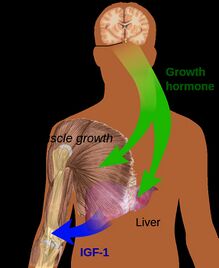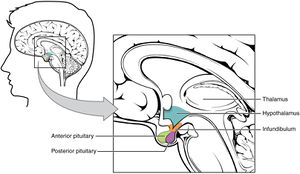Growth Hormone: Difference between revisions
No edit summary |
No edit summary |
||
| Line 5: | Line 5: | ||
</div> | </div> | ||
== Introduction == | == Introduction == | ||
[[File:HGH function.jpg|thumb|HGH function]] | [[File:HGH function.jpg|thumb|HGH function|alt=|268x268px]] | ||
[[File:Hypothalamus-Pituitary Complex.jpg|thumb|Hypothalamus-Pituitary Complex|alt=]] | |||
Human growth hormone (HGH), also known as somatotropin, is a 191 amino acid single-chain polypeptide. It is produced by somatotropic cells within the anterior pituitary gland.<ref name=":0">Brinkman JE, Tariq MA, Leavitt L, Sharma S. Physiology, Growth Hormone. InStatPearls [Internet] 2020 May 16. StatPearls Publishing. Available:https://www.ncbi.nlm.nih.gov/books/NBK482141/ (accessed 16.8.2022)</ref> | Human growth hormone (HGH), also known as somatotropin, is a 191 amino acid single-chain polypeptide. It is produced by somatotropic cells within the anterior pituitary gland.<ref name=":0">Brinkman JE, Tariq MA, Leavitt L, Sharma S. Physiology, Growth Hormone. InStatPearls [Internet] 2020 May 16. StatPearls Publishing. Available:https://www.ncbi.nlm.nih.gov/books/NBK482141/ (accessed 16.8.2022)</ref> | ||
| Line 12: | Line 13: | ||
HGH has numerous roles throughout life, from growth itself (including the turnover of muscle, bone and collagen) to the regulation of particular aspects of metabolic function, for example increased fat metabolism and the maintenance of a healthier [[Body Composition|body composition]] in later life.<ref>Godfrey RJ, Madgwick Z, Whyte GP. The exercise-induced growth hormone response in athletes. Sports medicine. 2003 Jul;33(8):599-613. Available:https://pubmed.ncbi.nlm.nih.gov/12797841/ (accessed 16.8.2022)</ref> | HGH has numerous roles throughout life, from growth itself (including the turnover of muscle, bone and collagen) to the regulation of particular aspects of metabolic function, for example increased fat metabolism and the maintenance of a healthier [[Body Composition|body composition]] in later life.<ref>Godfrey RJ, Madgwick Z, Whyte GP. The exercise-induced growth hormone response in athletes. Sports medicine. 2003 Jul;33(8):599-613. Available:https://pubmed.ncbi.nlm.nih.gov/12797841/ (accessed 16.8.2022)</ref> | ||
IGF-1 | Once secreted, HGH remains active in the bloodstream for a few minutes, allowing enough time for the liver to convert it into [[Growth Factors|growth factors]], the most crucial being insulin-like growth factor (IGF-1), which has growth-promoting effects on every cell in the body. Together, IGF-1 and GH promote normal growth of bones and tissues.<ref>Medline plus IGF 1 Test Available:https://medlineplus.gov/lab-tests/igf-1-insulin-like-growth-factor-1-test/ (accessed 16.8.2022)</ref> | ||
The use or distribution of HGH without a medical need and prescription is considered illegal.<ref>Dr Axe 9 Benefits of Human Growth Hormone, Including More Muscle & Less Fat Available:https://draxe.com/nutrition/human-growth-hormone/ (accessed 17.8.2022)</ref> | |||
== HGH Roles in Childhood and Adulthood == | == HGH Roles in Childhood and Adulthood == | ||
HGH acts on many parts of the body to promote growth in children. When the growth plates in the bones (epiphyses) have fused, HGH no longer increases height, but it still has important roles. In adulthood HGH impacts the bodies metabolism (how your body turns the food you eat into energy). | HGH acts on many parts of the body to promote growth in children. When the growth plates in the bones (epiphyses) have fused, HGH no longer increases height, but it still has important roles. In adulthood HGH impacts the bodies metabolism (how your body turns the food you eat into energy). | ||
| Line 21: | Line 23: | ||
# Regulation of lipid metabolism, body fat distribution, inflammation and vascular health . HGH secretion is effected by visceral fat. The adverse metabolic effects of increased visceral fat include HGH deficiency, with therapy to increase HGH significantly reduces visceral fat. Visceral fat accumulation is strongly associated with increased metabolic and cardiovascular risk, whereas subcutaneous fat appears to be beneficial with respect to metabolic health A 2015 review reinforces this, indicating that growth hormone-releasing hormone (GHRH) may be beneficial for people with obesity<ref>Stanley TL, Grinspoon SK. Effects of growth hormone–releasing hormone on visceral fat, metabolic, and cardiovascular indices in human studies. Growth Hormone & IGF Research. 2015 Apr 1;25(2):59-65. Available: https://www.ncbi.nlm.nih.gov/pmc/articles/PMC4324360/<nowiki/>(accessed 16.8.2022)</ref>.<ref name=":0" /> | # Regulation of lipid metabolism, body fat distribution, inflammation and vascular health . HGH secretion is effected by visceral fat. The adverse metabolic effects of increased visceral fat include HGH deficiency, with therapy to increase HGH significantly reduces visceral fat. Visceral fat accumulation is strongly associated with increased metabolic and cardiovascular risk, whereas subcutaneous fat appears to be beneficial with respect to metabolic health A 2015 review reinforces this, indicating that growth hormone-releasing hormone (GHRH) may be beneficial for people with obesity<ref>Stanley TL, Grinspoon SK. Effects of growth hormone–releasing hormone on visceral fat, metabolic, and cardiovascular indices in human studies. Growth Hormone & IGF Research. 2015 Apr 1;25(2):59-65. Available: https://www.ncbi.nlm.nih.gov/pmc/articles/PMC4324360/<nowiki/>(accessed 16.8.2022)</ref>.<ref name=":0" /> | ||
# Another role of HGH is blood sugar level control. HGH indirectly acts on blood glucose levels through the regulation of IGF-1, which mimics insulin's effect in the body, helping control blood sugar levels.<ref>Gilmore Health Role of HGH on Glucose Homeostasis in Humans Available:https://www.gilmorehealth.com/role-of-hgh-on-glucose-homeostasis-in-humans/ (accessed 16.8.2022)</ref> | # Another role of HGH is blood sugar level control. HGH indirectly acts on blood glucose levels through the regulation of IGF-1, which mimics insulin's effect in the body, helping control blood sugar levels.<ref>Gilmore Health Role of HGH on Glucose Homeostasis in Humans Available:https://www.gilmorehealth.com/role-of-hgh-on-glucose-homeostasis-in-humans/ (accessed 16.8.2022)</ref> | ||
== | == Physiotherapy Implications == | ||
[[File:Strength training.jpg|thumb|Strength training]] | |||
Exercise is a forceful physiological stimulus for growth hormone (GH) secretion, with both aerobic and resistance exercise bringing about a significant, acute increases in GH secretion. In opposition to previous suggestions that exercise-induced GH release requires that a "threshold" intensity be attained, recent research shows that regardless of age or gender, there is a linear relationship between the magnitude of the acute increase in GH release and exercise intensity. | |||
GH secretion decreases with ageing and obesity, bringing about many. Exercise is a robust stimulus of GH secretion, as as such is a great natural way to promote eg better bone, joint and muscle health. See [[The influence of human growth hormone (HGH) on physiologic processes and exercise]] | |||
== Resources == | == Resources == | ||
Revision as of 02:52, 17 August 2022
Original Editor - Lucinda hampton
Top Contributors - Lucinda hampton and Vidya Acharya
Introduction[edit | edit source]
Human growth hormone (HGH), also known as somatotropin, is a 191 amino acid single-chain polypeptide. It is produced by somatotropic cells within the anterior pituitary gland.[1]
HGH is secreted in a pulsatory way, generally following a circadian rhythm. Various physiological stimuli can cause HGH secretion, with the most influential non-pharmacological stimuli being sleep and exercise.
HGH has numerous roles throughout life, from growth itself (including the turnover of muscle, bone and collagen) to the regulation of particular aspects of metabolic function, for example increased fat metabolism and the maintenance of a healthier body composition in later life.[2]
Once secreted, HGH remains active in the bloodstream for a few minutes, allowing enough time for the liver to convert it into growth factors, the most crucial being insulin-like growth factor (IGF-1), which has growth-promoting effects on every cell in the body. Together, IGF-1 and GH promote normal growth of bones and tissues.[3]
The use or distribution of HGH without a medical need and prescription is considered illegal.[4]
HGH Roles in Childhood and Adulthood[edit | edit source]
HGH acts on many parts of the body to promote growth in children. When the growth plates in the bones (epiphyses) have fused, HGH no longer increases height, but it still has important roles. In adulthood HGH impacts the bodies metabolism (how your body turns the food you eat into energy).
- Growth: HGH induces growth in nearly every tissue and organ in the body. However, it is best known for its growth-promoting effect on cartilage and bone, especially in the adolescent years.
- Metabolic Effects: HGH impacts metabolism primarily by up-regulating the production of insulin-like growth factor-1 and its subsequent effect on peripheral cells. Predominantly, cells move into an anabolic protein state with increased amino acid uptake, protein synthesis, and decreased catabolism of proteins. Most particularly it is known for its effect on bone growth and musculoskeletal anabolism
- Regulation of lipid metabolism, body fat distribution, inflammation and vascular health . HGH secretion is effected by visceral fat. The adverse metabolic effects of increased visceral fat include HGH deficiency, with therapy to increase HGH significantly reduces visceral fat. Visceral fat accumulation is strongly associated with increased metabolic and cardiovascular risk, whereas subcutaneous fat appears to be beneficial with respect to metabolic health A 2015 review reinforces this, indicating that growth hormone-releasing hormone (GHRH) may be beneficial for people with obesity[5].[1]
- Another role of HGH is blood sugar level control. HGH indirectly acts on blood glucose levels through the regulation of IGF-1, which mimics insulin's effect in the body, helping control blood sugar levels.[6]
Physiotherapy Implications[edit | edit source]
Exercise is a forceful physiological stimulus for growth hormone (GH) secretion, with both aerobic and resistance exercise bringing about a significant, acute increases in GH secretion. In opposition to previous suggestions that exercise-induced GH release requires that a "threshold" intensity be attained, recent research shows that regardless of age or gender, there is a linear relationship between the magnitude of the acute increase in GH release and exercise intensity.
GH secretion decreases with ageing and obesity, bringing about many. Exercise is a robust stimulus of GH secretion, as as such is a great natural way to promote eg better bone, joint and muscle health. See The influence of human growth hormone (HGH) on physiologic processes and exercise
Resources[edit | edit source]
- bulleted list
- x
or
- numbered list
- x
References[edit | edit source]
- ↑ 1.0 1.1 Brinkman JE, Tariq MA, Leavitt L, Sharma S. Physiology, Growth Hormone. InStatPearls [Internet] 2020 May 16. StatPearls Publishing. Available:https://www.ncbi.nlm.nih.gov/books/NBK482141/ (accessed 16.8.2022)
- ↑ Godfrey RJ, Madgwick Z, Whyte GP. The exercise-induced growth hormone response in athletes. Sports medicine. 2003 Jul;33(8):599-613. Available:https://pubmed.ncbi.nlm.nih.gov/12797841/ (accessed 16.8.2022)
- ↑ Medline plus IGF 1 Test Available:https://medlineplus.gov/lab-tests/igf-1-insulin-like-growth-factor-1-test/ (accessed 16.8.2022)
- ↑ Dr Axe 9 Benefits of Human Growth Hormone, Including More Muscle & Less Fat Available:https://draxe.com/nutrition/human-growth-hormone/ (accessed 17.8.2022)
- ↑ Stanley TL, Grinspoon SK. Effects of growth hormone–releasing hormone on visceral fat, metabolic, and cardiovascular indices in human studies. Growth Hormone & IGF Research. 2015 Apr 1;25(2):59-65. Available: https://www.ncbi.nlm.nih.gov/pmc/articles/PMC4324360/(accessed 16.8.2022)
- ↑ Gilmore Health Role of HGH on Glucose Homeostasis in Humans Available:https://www.gilmorehealth.com/role-of-hgh-on-glucose-homeostasis-in-humans/ (accessed 16.8.2022)









